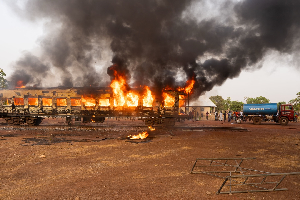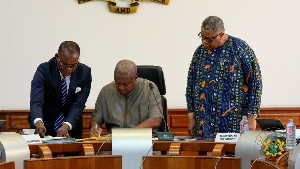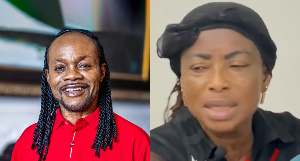The good and living book of God- the Bible notes a powerful message by Jesus in which he called for little children to be allowed unconditional access him, declaring “…for theirs is the kingdom of heaven.” The Bible also cautions us to remember our Creator in the days of our youth before the dark days.
Significantly, children and youth are the ‘darlings’ of Jesus Christ. They represent the future, growth, progress, and wealth; messing up their progress is tantamount to strategically developing weapons for creating mass poverty in its advance form.
So the saying goes ‘life begins at 40’. Well said. Meaning that after 40 years, it is the responsibility of the younger generation to spearhead the affairs of a society. They begin to show their maturity and professionalism by accepting the challenging leadership roles, whilst at the same time championing the development of the next cream of leadership in a sustainable manner.
What happens then? Society will have a flourishing cycle of human resources; efficient and ready for human development and its environment.
So 50 years down our history is the perfect time to have our first kind of youth leadership in our development process. But is this the case now? Most people certainly think no.
The average Ghanaian elder still considers the youth amateur, immature and not ready to be involved at the highest level of decision-making process. Hence, their slogan ‘your time is not yet up’ any time that issues of youth involvement and participation come for discussion. So when at all is the right time for the Ghanaian youth to be a participant in our leadership responsibilities?
At 50, there has not been any consistent and systematic youth development policy to shape their [youth] destiny. Even institutions established to channel the energies of the youth into productive ventures exist only in structures without vision and responsibilities.
Talk about the National Youth Council (NYC) and you will surely have a laugh of your life time. Not only has the NYC dominated by old civil and public servants who have lived out of their productive responsibilities, but also lacking vision, programme, resource support, youthful leadership and management prowess that can embrace the challenges of contemporary societies. The council is denied of energetic youth who have a great deal of their own problems and what it takes to surmount them.
This does not pertain to the NYC alone but other youth oriented institution across the country. All of them simply lack the resources, effectiveness and determination to turn around the raw nature of the youth into very innovative and competitive resources reflecting the changing contemporary societies we find ourselves.
It is therefore not surprising that after 50 years of sovereignty, Ghana continues to pursue the ‘status-quo agenda’ where youth issues (considered to be the main organ for wealth creation) are given a second hand attention and support. Go to every institution- from the churches to the mosques throughout the political, civil and economic institutions to the traditional king/queen ship and the issue of the youth as a second development agenda is every where.
The youth is significantly reduced to a class whose responsibility is only needed to push the agenda and objectives of the ‘yet-to-be buried’ oldies, take their venom without any efforts to integrate them into the high levels of decision making.
The success of every nation depends on the development of its youth; and not just any youth but those with quality education, effective training (morally and ethically) and better guidance.
So does it beat your mind to see the average Ghanaian youth on the outskirts of society swallowed by poverty and disillusions? No! Our attitude to towards education for the youth, the continuous provision of old fashion [formal] education and training without any effective work towards technical and science education by our institutions which fail to meet our development and business goals, and the politisation of such development ingredient as education, clearly contribute to the bane of our youth.
As a society we have failed to significantly place real value on education, hence our lackadaisical and ad hoc approach to it. Dr Klaus Seitz of epd-Entwicklunspolitik, Germany noted that “…The more education is valued, the greater is the political challenge to guarantee access and participation, and the more important it becomes to redress any inequality.”
So do we blame any one for the mass inequality in our society? Certainly no! Throughout our life as a society we continue to place lip services on education and training of the youth. We have also failed to identify and recognise the real value of it, hence nothing pose as a challenge which calls into action and commitment, our political leadership.
Our political leadership is just for the politics and politricks of it. What happens afterwards is a question of hope. But for how long can we live in hope without any concerted effort to be politically and developmentally responsible?
Is there a way forward for our youth as we take stocks of our past 50 years? What can we do so as not to waste the next 50 years? How do we restore the youth into more productive ventures for Ghana?
As we celebrate our golden jubilee, it is important we articulate youth issues pragmatically, cutting across sectoral dimensions. We have to challenge ourselves to:
[a] mix and match our levels of ideas, knowledge and resource transfers to actively drive forward innovations among the youth;
[b] evolve new agenda to support education and training from the basic levels, reflecting on our changing circumstances, business and social ethics, and leadership and management skills. This calls into the equation effective construction of channels of discrete interrelated systems responsibility functions that re-engineer individual, groups and institution and youth organisations to be at the core zone of innovation and wealth creation needs;
[c] encourage and equip, involve and allow the young drivers of our society access to mature leadership thinking, skills and positions to ensure their rapid and efficient development;
[d] develop high level of responsible and responsive systems of institutions capable of innovating and replicating mechanisms sensitive to our needs and aspirations as a people with identity and vision.
[e] inculcate into school kids through both formal and informal curricula, civic and political responsibilities, leadership through effective planning, organisation and management, knowledge and intellectual entrepreneurial ship.
We need to break such unproductive recycling of immature youth and help put a stop to the syndrome of forcing the Ghanaian youth into the periphery of decisions affecting the destiny of Ghana.
Limiting the energies and resources of our younger generation to the lowest level of thinking and innovation is a deliberate attack on the development process of Ghana and her wealth creation business. The cost is enormous- if not mortgaging our society into abject poverty, then we are at best wasters of natural resources and hence guilty of causing resource loss to the state.
At 50, Ghana needs her young and energetic people, for she has suffered a lot immature and always sidelined youth.















